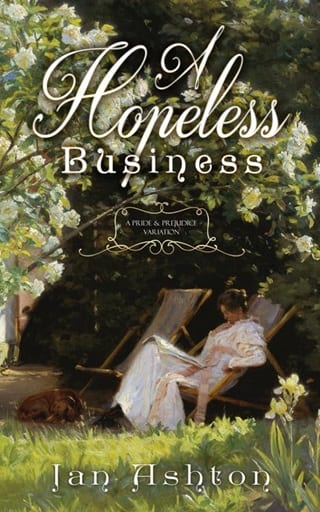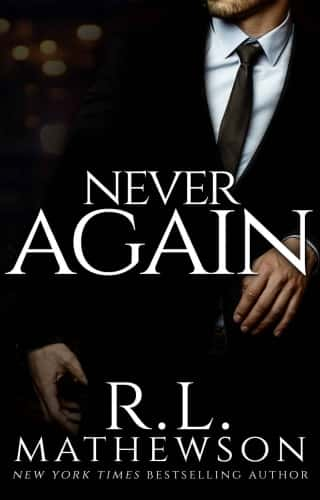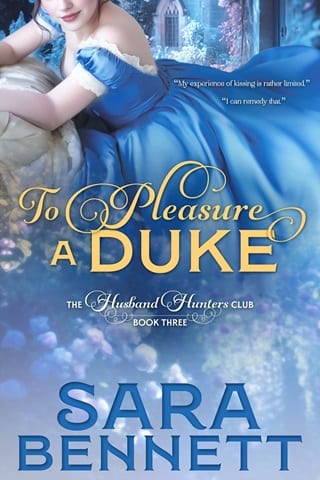Chapter 18
CHAPTER EIGHTEEN
S ince Sir William's departure a fortnight earlier, Elizabeth's visit to Hunsford, in company with the Collinses and Maria and a handful of amusing if interminable visits to Rosings, had passed slowly. With the arrival of Mr Darcy and Colonel Fitzwilliam, however, it seemed every day provided fresh conversation and amusement. While Mr Darcy was frequently engaged with his aunt's estate business, the colonel was especially eager to visit the parsonage. Elizabeth enjoyed his cheerful company; his observations were amusing, his conversation easy. And who did not like to laugh, or to see Charlotte lighter in spirits from such gaiety?
She supposed he saved any deeper thought for his duties to his men and the military, and was enjoying a respite away from those responsibilities. Mr Darcy carried heavy responsibilities as well and if his burdens followed him to the dark environs of Rosings' study and what she imagined might be neglected ledgers and accounts, she could not be happy for him. Or herself .
There was a fervour in the colonel, however, that—while amusing—gave her some discomfort. Unlike her younger sisters, she had never been partial to a red coat; the life of an army wife was not one to which she aspired. Although she hoped she was only a distraction to entertain him with conversation while trapped at the gloomy home of his aunt, Elizabeth determined that she would do all she could to discourage anything more. It was easy enough, when he sat near her and kept his attention fixed to her, to draw him away by speaking to Maria about her newest piece of embroidery or whether she knew of Mary's endeavours for the poorhouse.
When Elizabeth again chanced upon Mr Darcy, who appeared to be fond of the morning dew no matter its effects on his boots, she determined she would enquire about Colonel Fitzwilliam. After greeting one another and taking a path away from the main lane, towards Rosings's long-neglected maze, Mr Darcy surprised her by raising the topic himself.
"You must not think I willingly abandon you to my cousin's attentions. He is eager for entertainment. He despises being idle and can only ride, write letters, fish, and converse with Anne for so many hours."
"I see. Perhaps I should perform with puppets or do a card trick?"
"No, no, I do not mean to insult your charms," he said, looking mortified. "You provide wonderfully intelligent and spirited conversation, and I regret not having my share of it."
Elizabeth burst out laughing. "My word, Mr Darcy, I believe you have paid me a week's worth of compliments at the expense of your own equanimity. I am sorry you and Lady Catherine had no share of our fun."
Smiling, and clearly relieved, he said, "My aunt has a peculiar sense of ‘fun'. She would not follow that pleasure and happiness could come without any expense, but simply by listening and sharing another's small joys and heartaches. Cordiality."
"Cordiality underlies friendship and marriage. It is how I would describe the connexion between my aunt and uncle Gardiner, with whom I stayed in town. Of course, I believe Jane and Mr Bingley and Mr Goulding and his new wife also enjoy a similar amity."
If Mr Darcy, surely hunted by many ladies for his fortune, connexion, and handsome mien, was surprised by her expounding on felicity in marriage, he did not show it. But truly, why should he mind? He had been very clear in November that he had no designs on her. ‘You are safe from both of us.'
When he made no effort to agree or argue her point, she returned to their earlier subject. "I enjoy Colonel Fitzwilliam's company. Each of us suffers from some degree of idleness here."
Her declaration sparked a quick, rather sharp reply. "My cousin is a good man but he is overfond of flirtation. You need not fear unwanted attentions from him."
"I am grateful for your assurance—or was it a warning?" She laughed lightly to conceal her confusion at his bewildering change in tone. "Although I admit his figure and manners far exceed that of some previous suitors, I am not seeking a husband."
He seemed not to hear her. "I will warn him away from you, if needed. "
"I do not require your assistance, sir. Setting aside my own feelings, which are only those of a friend to your cousin, why do you wish him away from me? As I said, I am not seeking a husband. Jane is so full of goodness, she will need me to teach her children how to misbehave."
Mr Darcy stared at her for a moment before looking off in the distance. Whatever he seemed to wish to say went unsaid, and with all ease gone between them, Elizabeth blurted, "I received another proposal, in February from Mr Hurst's cousin."
He frowned and said nothing for a few moments. "I had heard something of Mr Nugent's application to you," he replied finally, gravely. "I confess I am glad, but not surprised, that you found him wanting."
The surprise—and dismay—was Elizabeth's, for having had him as witness to Mr Collins's unwanted entreaties, she was perversely disappointed Mr Darcy had not revealed his knowledge of this more recent event. Of course, it was unreasonable of her to feel this way; her romantic travails were none of his affair and beyond their previous walk, when had there been opportunity? However, his satisfaction that she refused Mr Nugent did please her. "Wanting for maturity and depth, yes. A fortune that includes a house with eleven bedchambers and three thoroughbreds in the stable is not an inducement to felicity for every lady." She paused to admire a cluster of bright yellow daffodils, tempted to pluck them but all too aware Mr Collins would be alarmed by her thievery of Lady Catherine's property.
"I wonder at Miss Bingley's lack of interest."
She turned to him, somewhat amazed. "Do you? Perchance she does not wish to live with her mother-in-law."
"Few wish for that circumstance," he said. "I met Nugent once, and know of his, um, household. He is much like Bingley was a year or two ago. Earnest and decent, but in need of some seasoning."
"Ah, yes, I liked him as I did Mr Bingley. But I am too sharp-tongued for such sweet harmony as Jane and Mr Bingley enjoy. My wretched wit would prove a great disappointment to Mr Nugent."
‘"Wretched?'"
Mr Darcy said it with such disbelief Elizabeth turned towards him, peering up to see why he was aggravated. His frown disappeared when he saw her concern, and his expression quickly softened. Shaking his head slowly, he gave her a small smile.
"Believe me, Miss Elizabeth, nothing about you is wretched."
She turned away, desperate to hide the blush she could feel heating her cheeks. "Oh, my father tells me to be kinder when I am courted again. In his wisdom, so long as my suitor has his hair, can keep me supplied in writing paper and walking boots and tolerate my impertinence and summer freckles, I can be satisfied."
"So little?" His voice did not hide his incredulity. "What of a good income, a home?"
"Those are important as well, but one should not discount the importance of good teeth and hair. So few men can boast of both, I feel quite safe from any importuning."
Her heart was full that afternoon, thinking about her conversation with Mr Darcy . He is as charming as his cousin, but more careful in displaying it—even to me, whose feelings he does not encourage. He was, she decided, a man accustomed to controlling himself and managing others. He had concurred with her thoughts on Mr Nugent, and not appeared overset by her nervous chattering.
And she had nervously chattered. He discomposed her—his steady gaze and the way he gave her his full attention, his thick, wavy hair, and the striking handsomeness revealed when he smiled.
Poor Miss de Bourgh, his own rebuffed intended, seemed to have been denied not only charm, but the ability to exert control over her own life, an opinion which altered when she accompanied Colonel Fitzwilliam to the parsonage, driving up in a little phaeton drawn by a pair of prancing white ponies. Elizabeth watched from the grassy mound across from the house, where she was labouring over a pencil sketch of the parsonage for Charlotte, as he clambered out of the vehicle. Miss de Bourgh refused to leave her seat and come inside, instead instructing him to remain at the house until her return in half an hour. Her companion, the Mrs Jenkinson known primarily by Elizabeth for having a pianoforte in her rooms, nodded, and the two women and the phaeton disappeared quickly down the lane. Amazed by the delicate lady's brash directive to him, Elizabeth looked at the colonel, who only shrugged as he walked over to join her on the grass. "Anne prefers to drive with those who do not tell her to slow down or take care on turns."
She shrugged as well, already knowing that the next thirty minutes would be enjoyably spent. They would be more enjoyable had Mr Darcy joined them. Perhaps the colonel saw something in her expression, for he said, "Anne has little enough for entertainment, and she grows weary of my conversation. She does not care to laugh as you do."
"In that she is more like your other cousin, Mr Darcy. He smiles, but I have rarely heard him laugh."
"No? Your confinement in a damp boat-house did not provoke a belly laugh?" He chuckled, but his understanding was apparent. "You have been in company with him here, where he is careful not to show the very little joy he takes in his visits, and at Bingley's place in the country, where Miss Bingley may have attached herself to his side and made him rather miserable."
She laughed at his perceptiveness, and setting aside her earlier musings on Mr Darcy's smile, said, "Indeed, although I may not know Mr Darcy well enough to determine a frown of misery from a grimace of annoyance, his expressions here and at Netherfield are remarkably alike."
"Whether or not he can show it, Darcy has told me how much he enjoys your company."
The surge of feeling those words gave her would be examined later. Hoping the heat in her cheeks would subside quickly, she said, "A gentleman in his position, rich and eligible, must be careful in the company of young ladies. Fortunately he knows he is safe from me, and I from him, and that makes for an ease in our conversation."
When Colonel Fitzwilliam appeared surprised by her observation, Elizabeth began worrying that she had done just the opposite of what she had intended: given him hope if he —despite what Mr Darcy had said—wished to pursue her.
No, you must stop this, she told herself. Not every man you meet wishes to marry you. Only those too green or too unbearable to contemplate.
"Even the most well-guarded heart is vulnerable, Miss Bennet." He smiled becomingly, and as Charlotte had pointed out to her the day they all first met, the colonel's broad grin rendered him almost handsome. "Not mine, of course, for I have no time for affairs of the heart. It is better to cry for one's mama than for the poor wife you may leave a widow."
On Sunday, she sat in church mindlessly counting the number of times Mr Collins inveighed against sin. She had already heard him reading the sermon aloud in his study, both before and after Lady Catherine had made her changes to it. Now, as her mind wandered, she allowed her eyes to drift as well, settling them on the tall man in the front pew beside the great lady herself. Mr Darcy sat straight and tall, alert and seemingly focused on Mr Collins. It was an admirable use of his concentration, for she could not pretend such interest. Within moments, she saw his expression shift, and his head turn slightly to the side. His eyes met hers. Blushing to be caught staring, she pulled her eyes away but not before she noticed a slight lift to his lips. As she did, Elizabeth felt as though she was being scrutinised; the skin on her neck prickled with the sensation. Much as she wished to turn and discover who was watching her, the wide brim of her Sunday bonnet prevented it. She satisfied herself that it likely was one of the idle widows or the Johnson girls she met when accompanying Charlotte to deliver a food basket and clean cloths when their baby brother was born a fortnight ago.
She smiled at the girls later in the churchyard and while Charlotte and Maria spoke to a neighbour, she watched Colonel Fitzwilliam help his aunt and cousin into their carriage. Mr Collins stood nearby, engaged in conversation with a roughly dressed man she assumed was requesting some assistance; a frowning Lady Catherine watched the two men, heedless of her daughter's struggles with her shawl in the other seat. The colonel saw it, however, and as he moved to assist his cousin, Mr Darcy stepped away from the carriage and towards her.
"I hope you are well, and not overly beset by visits from an idle soldier."
The joking tenor of his voice made her smile—their previous conversation about the colonel seemingly forgot—and she sought to make clear she was not the sole object of those visits. "The ladies of Hunsford Parsonage have appreciated the levity your cousin brings with him."
"I regret my obligations have prevented my joining him. Tomorrow, if the weather is good, is the date of our excursion to the fabled oak. "
"Oh yes. We are all excitement for it."
"Good." He gestured towards Charlotte and Maria, and walked her to them. "I should caution you that the tree is so large and so fearsome in appearance, that if Lady Catherine ever deigned to walk out and see it, she would command it be cut down in all due haste. You see, only manicured, well-behaved trees in the style of the French are permitted within Rosings Park."
"I understand you are teasing me and I am sworn to silence," she said, delighted with his wry warning. "But as with anything that is much praised, I hope the truth of its looks will not disappoint."
 Fullepub
Fullepub 



